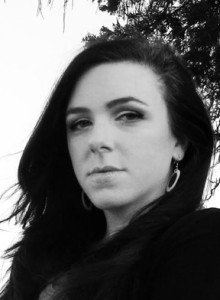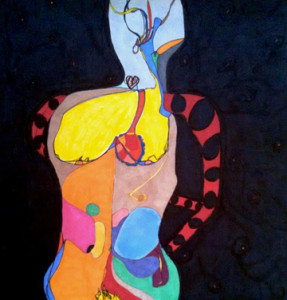Xavier Vega: It was a nice surprise to get your email asking that I interview you. It was also funny, considering we’ve never actually met in person, but I’ve come to value the friendship we’ve built working on Apeiron Review together. I also appreciate the feedback you’ve given me on some of my work (and I hope my feedback on your work has helped).
So thank you for reaching out to me. Once this goes live, I can tell people that something I wrote ended up in the same place where some Margaret Atwood poetry ended up! But on to business.
I loved “Hot Bones.” The concept itself is creative and fun, even though it addresses the grim reality of death and loss. I’ve read a lot of your work, and I really appreciate the imagery you create because it sparks the brain to create and fill in the blanks. Carrying the grandfather in on the platter reminds me both of a pallbearer and of children climbing their mountain of a grandfather as they shower him with attention. And just as everyone feasts upon hot, fresh grandpa, burning their fingers in haste, I see the same happy children swarming this figure to consume him.
You told me that you thought of this poem in a dream, but I have to ask: What is your process for coming up with your imagery? Do you actively create it, does it all come from dreaming and daydreaming, or do you wait for inspiration? Once you have that image, how exactly do you manipulate it to carry your work?
Ashley Hutson: “Hot Bones” was based on a dream I had the morning my grandfather died. I was 17 at the time. I didn’t eat roast beef for five years after that, so the dream left an impression. In a more general sense, I don’t know if I actively create anything, honestly. I actively edit, but the method of creation is cloudy to me. That sounds very pretentious, doesn’t it? But I often read things I’ve written and marvel: where did it come from, when did this get written? How did I write it? Writing is a physical act that I can recall doing with no understanding of how it was done.
Dreams are wonderful because there is no editor present. Bits of collected information can play around, fit together in unexpected ways, and that’s very attractive to me. In waking life, the kernels of stories tend to be small, inconvenient revelations. I’m usually doing something very practical that requires completion, and then—whammo! Behold the beauty of our frail neurons firing randomly.
XV: Oh yes, it’s always when you’re not even thinking about writing that things begin to make sense, or just as you’re about to fall asleep, and of course dreams when the conscious mind is out for lunch.
You and I actually had some previous discussions about dreams and dream journals. Can you tell me about any other wild dreams you’ve had lately?
AH: Hmm. I dream a lot about my grandmother’s house, which is long gone. Whenever I’m anxious, I dream of angry oceans. My dream life is vivid, luxuriant. I often find it difficult to rouse myself in the morning.
XV: That’s a good sign. It’s better than forgetting everything and letting it all slip away.
Now “Hot Bones” isn’t your only flash piece. In fact, most of your work falls into flash fiction and short poetry. But you have published a high volume of flash, and your pieces are always rather poignant and tight. There’s genuine emotion without excessive gushing or mountains of world-building and scene setting. Why do you feel you’re so successful with flash? Is it a matter of comfort, interest, or something else?
AH: Well, you’re too kind. I’m flattered. I have sort of exhausted the short arts, haven’t I? (laughs) I don’t know why I prefer it. Perhaps I’m attracted to the challenge of limited space. Everyone says that, so I’ll join the chorus. Something brief requires climbing to the highest pitch and remaining there for the duration. The limitation is attractive. A relief, in some ways. Limitations offer the impression of control and the illusion that I know what I’m doing. Then I write a poem and realize that I don’t know what the hell I’m doing. But poems need the highest density, and are therefore the most difficult. Look at tankas and haikus. Devastating things can be done in a few lines. And they’re devastating because they are so brief, because they are able to hit that pitch and sustain that intensity.
And yes, it’s a matter of mental comfort. The fewer words I have to worry about, the easier. The idea of writing a novel gives me palpitations. I fear it would never get finished; it would be an endless, obsessive rewrite. I look at 500-word stories I’ve published in the past year and itch to rewrite them. But I think that’s positive; it signifies change. My eye for what I think is “good” is evolving.
XV: I think you put it well when you describe it as density. It could be said that you’re giving your inspirations the appropriate level of time, attention, and focus that they demand from you, inside your head where you negotiate thoughts and emotions. No more, no less, depending upon how much your subject matter really lingers in your head.
Having said that, is there anything going on in your life, any obsessions, any themes or ideas that just keep popping up? Do you think perhaps those areas of passion could move you to create something bigger?
AH: Oh, I don’t know. My external life is happily boring, thank goodness. As far as recurring themes or ideas, there are the usual writerly considerations: memory, time, health, identity, etc.
More specifically, I’ve always been interested in the issue of guns and our American relationship with them. Anything military or war-related, past or present, fascinates me. I live in Sharpsburg, Maryland, too, where the Battle of Antietam took place–now famously billed as “the bloodiest day in American history.” There are a lot of guns, or ghosts of guns, floating around my brain.
I think about other stuff, too, and I’ve certainly published a wide range of things. In my ongoing writing life, however, the above-mentioned subjects feel most important to me. Perhaps they’ll inspire me to something larger. I hope so.
XV: I would love to read something about guns that isn’t politically charged or exploitative, you know? Without jumping to conclusions or preexisting beliefs, what does their existence and popularity truly say about the human condition and the American experience? The phrase “a weapon is an extension of the body” springs to mind, and I hope to see your take on that in the future.
Now one thing I’ve noticed in your writing is how you come back to things like sanctity, tradition and ritual, and you add a twist to these things. In “Hot Bones” the image of enjoying grandpa for dinner could come off strange out of context, and in your story over at The Conium Review “The Hen of God” we see a nun struggling with celibacy and sexuality in a very intriguing manner. And you’ve also dealt with soldiers and the empty thanks given to them before they’re forgotten, you’ve commented upon small towns that fall into incestuous spirals of monotony, and some of the hush-hush turmoils and truths about relationships.
Does this come from a deliberate place, where you hope to challenge these things intellectually, or is it more of an emotional yearning where you feel compelled to speak up? What drives you in this sense?
AH: It goes back to the question about creating work. Why and how are mysteries to me. (I was applying for a grant the other day and had to discuss the “themes” that run through my work, and I was clueless. If I weren’t me, what would I say? I wondered. So your analysis is helpful.)
I think every writer has certain issues or events that concern them, of course, but I don’t usually sit down and decide to write about X. As with any mystic or conjurer, it’s best for a writer to take an oblique approach. I try to sneak up on it. I like ideas, I like putting together words like Legos. I never even played with Legos; I was more of a TinkerToy gal. But Legos seem like an appropriate metaphor. I like to hear words click together. If I can construct something solid and weight-bearing, I’m satisfied.
XV: I see. Don’t chase it but don’t wait for it to come to you. Very organic. I’m reminded of the anecdote about Jane Goodall; she camped hundreds of yards away from the apes she wished to study, letting them see her from afar and get used to her presence. Slowly but surely she came closer and they let her into the fold. Haha.
But tell me a little about this grant you applied to.
AH: I like the Jane Goodall comparison. That’s exactly it. As for the grant, I’d rather not mention it. I probably won’t get it. I’m relatively new to the scene, with nothing to my name except for a small handful of publications. I’ll have to earn a few more chops before people start trusting me with fistfuls of money. But I still try! I’m an impudent little thing.
XV: I understand, I’m in roughly the same boat. Nothing like the charge of youthful exuberance to agitate the literati.
To close out this interview I have something strange to tell you. A friend of mine will occasionally shine a morbid streak and begin asking me odd questions. This of course causes a contest where we ask each other increasingly disturbing questions. One that I was unusually proud to have come up with was “If a group of gourmet cannibals were to prepare you for a fine dining experience, how would you like to be served?”
My friend didn’t miss a beat; not only did she have an answer, she had several answers, dictating how various parts of her body should be cooked. I believe her tummy was to be served flank-steak style and her digits to be deep fried, among many other things.
So, in light of the feast of the grandfather in Hot Bones, I pose the same question to you. How would you like to be served?
AH: What a question! It’s tough for me to take real-life cannibalism lightly. It seems like such a bleak practice. I could ask these gourmet chefs to turn me into something that sounded beautiful—a creme anglaise, a raspberry gastrique, a summer roll—but that makes the scenario all the more ghoulish. I say these things as a living person, though. As a dead person, I wouldn’t have an opinion on how I’d be served. I’d be beyond caring.
XV: Well put. Thank you for your time, and thank you for choosing me to interview you.
Xavier Vega grew up on a strawberry farm in Plant City, Florida as the child of Mexican immigrants. He moved to Tampa and earned a B.A. in English at the University of South Florida where he was published in Thread Literary Inquiry. His work has since been featured Apeiron Review (where he later became a slush reader and worked with Ashley Hutson), The Bangalore Review, Mandala Journal, Crack the Spine, Raven Chronicles, and Yellow Medicine Review, where he was nominated for a Pushcart Prize. He currently resides in Saint Petersburg, Florida. He sometimes posts things on a blog at https://xaviervega333.wordpress.com/



Pingback: River Teeth, r.kv.r.y. interview, and beyond – ashley a. hutson